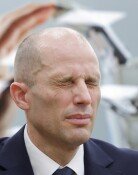Cheong Wa Dae Appointments Criticized
Cheong Wa Dae Appointments Criticized
Posted August. 14, 2006 03:07,
Nowadays, we often hear from government employees that ministers and vice-ministers exert much lesser power than before. This is because they view that the voice of ministers and vice-ministers is remarkably low compared to before, particularly in making relevant policy decisions and hiring subordinates and high-ranking officials of ministries affiliated organizations due to pressure from Cheong Wa Dae
In past, people sarcastically called the Bank of Korea a branch office of the Ministry of Finance and Economy in Namdaemun. Now, we call the Central Government Complex the branch office of Cheong Wa Dae in Sejongno, and Gwacheon Government Complex, in which government departments related to economy abound, the branch office of Cheong Wa Dae in Gwacheon.
The former vice Minister of Culture and Tourism Yoo Jin-ryong who was unseated recently revealed that Cheong Wa Dae exerts undue pressure in the ministrys personnel management and also revealed the name that Cheong Wa Dae recommended. Because of this, the governments unfair personnel management intervention is drawing a great deal of attention from the public.
Ministers have little authority for recommending and hiring new employees.
According to Framework Act on the Management of Government-Invested Institutions, competent ministers have the right to recommend new heads of government-invested institutions to the president after an examination by the recommending committee and public recruitment. After this, the president employs new heads of the institutions. However, in terms of institutions which are subject to other acts, such as the Korea Industrial Bank and the Export-Import Bank of Korea, the president can employ a new head after just listening to competent ministers recommendation.
During the Kim Dae-jung administration, there were several ministers who had strong recommendation power such as Jin Nyum and Jeon Yun-churl, former Deputy Prime Minister and Minister of Finance and Economy. However, for the current Roh Moo-hyun administration, it is very rare to see ministers like them.
In last May, Han Duck-soo, former Deputy Prime Minister and Minister of Finance and Economy, recommended two figures after public recruitment as nominees for the new head of the Korea Minting and Security Printing Corporation. However, Cheong Wa Dae rejected it, saying they were not appropriate figures for this position and announced public recruitment again.
In the end, Lee Hae-sung, the former presidential secretary for public information, who was defeated in the 17th general election, was appointed as the new president of the corporation.
In fact, even though Shin Dong-gyu, president of the Export-Import Bank of Korea, finishes up his tenure of office on September 3, there is almost nothing to proceed for appointment of new president of the bank.
Despite this, its competent minister Kwon O-kyu, Deputy Prime Minister and Minister of Finance and Economy, is out of office now for summer vacation from August 14 to 17. About this, one expert in financial sector sarcastically said, What is the problem? Everything will end up at the hands of Cheong Wa Dae.
In addition to this, there are increasing complaints about the unfair intervention of Cheong Wa Dae in the appointment of new government officials, which is serious enough to damage the rights of personnel management of ministers and vice-ministers. One government official from a department related to the economy said, Even though there is difference to some extent depending on ministers, it is very clear that Cheong Wa Daes intervention has noticeably increased compared to the past.
In regard to this, there are a series of cases that gave rise to public criticism until now.
For example, the Korea Exchange had a very difficult time appointing the first chief director since its founding in last January.
At that time, a recommending committee pointed to three candidates including Jeong Geon-yong, the former president of Industrial Bank of Korea. However, all candidates, out of sudden, refused to run.
Regarding this, Gwon Yeong-jun, professor of the International Management Department at Kyunghee University and a member of the recommending committee revealed, Cheong Wa Dae gave us pressure by giving us call. This provoked controversy at that time.
After going through the recruitment process again, the recommending committee appointed Lee Young-tak, the former director of office for government policy coordination, who was defeated in the most recent general election.
Government-invested institutions have also gone through similar experiences. While appointing the supervisor of these institutions, including the Korea Exchange, unfair intervention from Cheong Wa Dae has been noticed and appointments ended in favor of figures that have connections with the ruling party or the government. People say that the most of appointments were settled in accordance with powerful figures direction.
The Roh Moo-hyun administration shows a tendency of appointing figures that have similar views with the direction of the current government. I think this is because personnel management is not operated by system but by the intention of the president, said, Oh Yul-gun, professor of Dankook University.
In regard to this, Chung Tae-ho, a spokesperson of Cheong Wa Dae, said, The appointment of presidents of government institutions is operated by system not by personal connections.




![치매 발병전 스스로 후견인 지정, 한국 229명 vs 일본 12만명[히어로콘텐츠/헌트④-上]](https://dimg.donga.com/c/138/175/90/1/wps/NEWS/IMAGE/2025/12/17/132987628.1.jpg)


